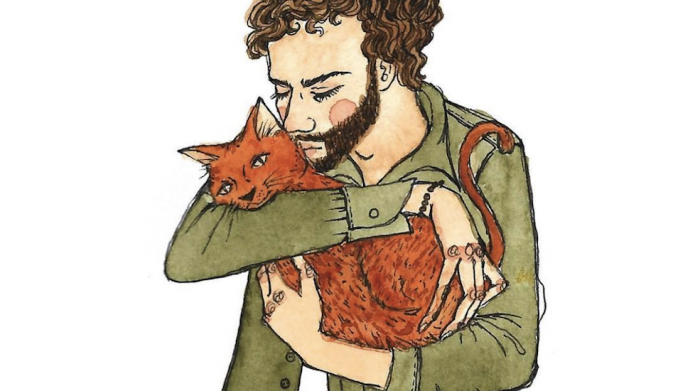The present American cultural conversation is deeply engaged with the question of what it means to be a man.
The feminist movement of the previous century broke apart rules that subjugated women while simultaneously challenging entrenched gender roles applied to women.
The roles of their male counterparts were naturally questioned by this shift.
Poet and activist Robert Bly terms the predominant “model of manhood adopted by many men” as “the Fifties male.” He describes this person as one who “got to work early, labored responsibly, supported his wife and children, and admired discipline.” Bly continues that underneath this simple outward appearance this person is marred by “much isolation, deprivation, and passivity.”
The torchbearers of this Fifties man have not taken questions to their model well. They join openly racist and sexist men’s rights groups and fetishize aggrandizing, chauvinistic men like the American President Donald Trump. Although this is not a healthy expression of their masculinity for society, it is an understandable one.
Many people within the American society would be repulsed by the idea that it’s understandable for any person to express themselves through acts of hate and aggression. There is a part of me that is repulsed for saying such a thing. But there’s a deep part of me that relates to these expressions.
I am not far from these men. I grew up believing the American cultural mythos that a “real man” represses his emotions. This belief as well as an emotionally then physically absent father crippled my ascent to manhood. I began to experience major depression as a pre-teen, which lasted well into my 20s. My sense of self was so diminished that I only knew myself through fear of others. It reminds me of Bly’s declaration about the Fifties man that “unless he has an enemy, he isn’t sure that he is alive.”
Boys rely on societal and cultural values to ascend into manhood. It is the foundation of their mental maturation process. Like the maturation of the body, people go through maturation of the mind. As the body develops through physical use, the mind develops through mental use. A person’s body learns the minutiae of shooting a basketball by practicing and playing for years. A person’s mind learns to manipulate thought by reading and writing for years.
One of the many functions of the mind is to act as an emotional response regulator. When an emotion is brought up, the mind can either let the body feel, block, or redirect it. This knowledge is developed during the mental maturation process. The process teaches boys how to respond to their emotions in a way that is socially and personally balanced. A mature man can respond to his emotions in a healthy way.
Unfortunately, the contemporary American culture fails to adequately guide boys through this process. Through his research, Robert Bly concludes that this maturation process requires “active guidance,” which traditionally came in the form of elaborate myths and elder men.
In their book King, Warrior, Magician, Lover, researchers Robert Moore and Doug Gillette conclude that “the Protestant Reformation and the Enlightenment…discredited” and destroyed the Western mythos of man. In its wake are the poor excuses for men provided by Hollywood and Madison Avenue. The characters they tout as men are externally focused, stoic stand-alones. These flat figures lack the depth required to guide boys into men.
Elder men are not around to pick up the pieces. The writers of the Academy of Ideas cite a study that found “only 17% of American men reported having a positive relationship with their father during their youth” and that “in most cases the father was physically or emotionally absent.” Bly points to men’s societies as a societal good that stepped in for absent fathers. There are no groups like this in the American culture landscape. The closest thing for many men may be the hate groups posing as men’s rights groups.
I feel sympathy for the men who feel the need to join these groups and express themselves through fits of aggression. These acts do not come from a healthy place. They come from an individual using his mind to trap his emotions through no fault of his own. The society and culture has taught him to fear his deep nature as an emotional human being.
This does not mean these men are broken or that passive men are emotionally developed. Things get warped during the maturation process. If a person focuses on lifting weights with his arms, then his legs will remain underdeveloped. If a person focuses his thought on engineering, then his artistic expression will be underdeveloped. Emotional repression of any sort, whether to aggression or passivity, is a type of mental warping that leaves the person underdeveloped.
I was severely underdeveloped when I left home for college. My lack of self and abundance of mental health issues made it difficult for me to function socially. The overwhelming majority of my expressions were self-deprecating remarks, sarcasm, and criticism. Due to the wrecked culture I found on campus, this served me fine until graduation. But it destroyed me in the work world.
People need a release for their emotions. The emotionless figures glorified as archetypal men do not represent the true nature of man; they are hardly human at all. Emotions are a natural and essential part of the human experience. I had no clue how to be with my emotions. I quickly became isolated and unstable in the working world. The ways I behaved in high school and college were clearly not going to work, but I had no other model.
I am not alone in this. It is endemic in America. It is the elephant in our monkey-sized room. A person’s deep primal aspects express and know themselves through the emotional channels. When one is blocked through repression, the emotion will either remain stuck in the body or find another channel to go through. Every man feels the call from his deep self to heal from the emotions it has stored for years.
The modern American man expresses himself through aggression and hate because it is the only channel he has available to handle the overwhelming amount of pain stuck within. These acts are not a sign of a broken person. They are a call to our society to help them heal.
My deep self guided me to healing. It was no longer interested in carrying the weight of stale emotions. I didn’t have the tools to process them, but it naturally sought out the path to manhood that Bly describes in Iron John: A Book About Men.
The first step is accepting the presence of the deep self. The title character of the tale is a Wild Man “whose body was as brown as rusty iron…[and] hair hung down from his head over his face and all the way to his knees.” He lives in “a deep pool of water” in a “dangerous forest.” He is the deep self within every male. He pushes emotional injuries to the surface when it is time for the man to grow.
I first sought out my personal Iron John through fraternity life. I expected shared values with a group of men to direct me into manhood. The best laid expectations can turn out to be a crapshoot. Boys leading boys will never result in men. Emotional development through exploiting women, drinking in excess, and hating other men is like mending a knife wound with a bullet hole.
Many people get stuck here because the current American culture makes it difficult to escape from this pattern by actively vilifying the few alternatives it attempts to provide. Boy psychology is a state of fear and uncertainty of self. It takes a leap of faith to break from socially accepted norms. That leap becomes tremendous when the culture promises abandonment for taking it.
I had to take the leap as the bottom fell out quickly after college. My mental health deteriorated. In its place, I turned to religion. I found a sense of purpose and ease when I became involved in an Orthodox Jewish group. This was nice for a short time but could not satiate my needs. The years of hiding from my wounds had served only to exacerbate the issue.
In the Iron John story, the Wild Man becomes a mentor to the boy. I deeply craved a mentor and a method for taking ownership of my emotions. Neither of which was something this community could provide.
The Iron John tale follows a linear story line. The boy develops neatly in stages. After the Wild Man mentors the boy in the forest, the boy is sent to develop within society. The boy is then hammered into a man through trials and tribulations. Life is more cyclical. Each stage of the journey is happening concurrently at different levels for each wound. Additionally, after one cycle is completed, the journey is repeated at another level.
Things reached a headway when my deep self’s pressing of and superficial self’s inability to process my emotions materialized as a mini-psychotic break. The results of which were a new therapist and her suggestion that I try yoga.
Yoga has so far proved to be the thing I needed (both the physical postural and mindful spiritual practices). I have used it as a medium to traverse the psychological development cycle many times. I left home, sought out mentors, and overcame challenges. Each cycle through has led me to a deeper layer.
This is not to say that yoga is the way for boys to heal to men. Like any medium for growth, it provides plenty of ways to become entrapped. In fact, I spent many years using it to further entrap myself.
I demanded intense and rigorous routines from myself. I tried to turn many older men into mentors. I got caught up trying to be initiated through superficial accomplishments.
There are probably things that I do now that are reflections of that same desire. However, each cycle through was beneficial because it brought me closer to my inner Wild Man. With each one, I picked up the tools needed to truly own my emotions and drop the superficial aspects.
Every person needs a unique set of circumstances for this path. The superficial things that worked for me will not work for most people. The individual must listen to his own call to leave home.
There is no set path to the forest of the Wild Man. However, the most fruitful ones are the ones that appear to be the most difficult.


 Share on bsky
Share on bsky





Read 4 comments and reply